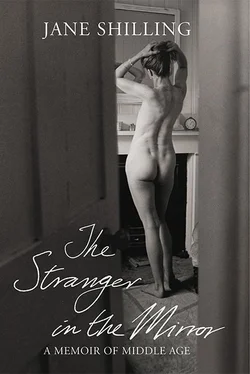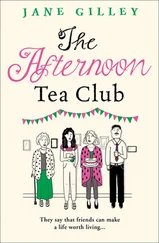The inside of her house resembled the interior of a gypsy caravan: the ceiling swagged with fairy lights and tinsel garlands, a cuckoo clock piping the quarter-hours, family photographs on the walls, lace drapery at the windows and on the tables, a throng of life-sized china dolls in frilly costumes directing a fixed stare at visitors from their positions on either side of the fireplace and beside the easy chairs. Violet’s mother, she confided, was a Romany who had never worn a pair of shoes in her life.
Judy, for all her warm neighbourliness, was diffident, nervous, highly strung. Violet was indomitable. She had buried her husband (a fine-looking man with dark eyes and a pencil moustache whose portrait hung on the wall) and one of her daughters, but her spirit was high. She had a much younger boyfriend in his late sixties (‘my toy boy’) a meek, silent man, always dressed in a dark suit and a white shirt, who sheltered from the unrelenting barrage of conversation behind a copy of the Racing Post . And while she took a polite interest in my son, what she really wanted to know about was my sex life.
In vain I tried to explain that I hadn’t got one; that I was too busy being a mother; that my reverses in love had put me right off the idea of men.
‘Course you want a boyfriend, pretty young girl like you,’ said Violet. ‘Who was that I saw knocking on your door the other evening?’
‘That was just a friend, Violet.’
‘Huh!’ said Violet, disbelievingly.
A couple of years after moving in I did take up for a while with someone who was away most of the time, a doctor serving as a reservist with the UN. He came to visit one weekend and locked us out of the house. We had to knock on Violet’s door and ask if we could climb over her wall. I was mortified. Violet was enchanted. ‘Lovely-looking feller,’ she said, after he’d returned to his duties. ‘You want to hang on to that one, my girl.’
She was so lively and sociable, her glamorously dressed departures to her Bingo evenings and raucous late-night returns such a reproach to my bread-and-butter life of office and nursery, that I didn’t notice at first the web of family ties of which she was the centre. I knew she had a married daughter (‘my Sylvia’) who lived close by, and that she was frequently visited by her dynasty of grandchildren, great-grandchildren and great-great-grandchildren. But it wasn’t until 13 years after I had met her, when she took to her bed in her mid-nineties and announced her intention to die, that I really saw the family close around her.
In the full vigour of a riotous old age, she still took a keen interest in the important frivolities of life. But one day she simply turned her face to the wall and said that she’d had enough. I had gone round just before Christmas to deliver her present (always so easy to buy presents for Violet, her appetite for pretty things not a bit sated by age – none of that nonsense about ‘Don’t bother getting anything for me, I’ve got everything I need’). But this time was different. Violet was sitting up in bed – very unusual for her not to be up and dressed in her best on Christmas Eve – discussing coffins with her daughter. ‘Show Jane the catalogue,’ she said. The funeral was all paid for in advance. It remained only to choose the details: oak or mahogany? Horses or limousine?
‘Don’t be ridiculous, Violet,’ I said. ‘You’re not going to die. You’re going to live for ever.’ I was appalled, almost angry, that this healthy, elegant, sociable, amusing old woman should be planning her own funeral. It felt like a personal affront, as though we, her family and friends, weren’t interesting enough to keep her attached to the world.
And something else frightened me – the idea that in old age the world might become, not unendurable because of pain or extreme decrepitude, but simply insipid: that tedium might prove stronger than love or gossip, the prospect of a new dress, a new baby grandchild, a new day. That you might wake one morning and find life too dull to continue living seemed entirely shocking. ‘It’s the cold weather,’ I said. ‘You’ll feel better when the spring comes.’
Spring came, but Violet declined to get up. For the first time in all the years since we had been neighbours, she failed to make the trip to the pound shop to replace the plastic flowers in her front garden. She lay in her bed (dressed, I noticed, in a series of showy lace nightgowns, which made me hope that she hadn’t entirely given up on life) and wept. There was nothing really wrong with her; not physically, at any rate. She got up to wash, ate regular meals, rallied at the prospect of amusement, sparkled for visitors, kept the mixed hospital ward in a roar of ribald hilarity when she was briefly admitted for anaemia, but continued to insist, without drama, that she’d had enough.
‘Honestly,’ said her daughter, locking up for the night, ‘it’s like closing up a tomb. She just lies there with the curtains drawn and cries. Doesn’t even want to watch the telly any more.’
Another Christmas came and another summer – damp and miserable, this one – not worth getting out of bed for, even if you weren’t tired of life. Violet continued to lie in bed, a little weaker from lack of exercise (‘Look at me arm,’ she said, producing a round, pearly, unwrinkled limb from under the bedcovers. ‘It’s wasting away!’) but with her sharp wits and her remarkable constitution unimpaired. Death, the longed-for visitor, refused to call.
The way in which Violet’s family gathered to support its matriarch struck me as exotic. In particular, I was fascinated by the matter-of-fact way they incorporated indignity, mishap and death itself seamlessly into the fabric of their lives. One day, as I bent to sit on the frilly counterpane at the end of Violet’s bed, I noticed that a white plastic potty had appeared on the lace-draped bedside table, next to a vase of flowers, a glass containing Violet’s teeth and a stuffed rabbit. Violet noticed me noticing. ‘I can’t walk no more,’ she said, offhand, and went back to describing the night a couple of weeks before when her boyfriend (who had a history of manic depression) had got up in the small hours, dumped her in the bath in her nightie, then driven at top speed around the living room on her mobility scooter while the china dollies looked on with blank glass eyes.
It sounded a dreadful experience, and I said so. But I could see that my expressions of dismay weren’t at all the required reaction: I was treating Violet as the victim of this alarming incident, but actually she seemed quite invigorated by the shindy. Upended in the bath, she’d given him a right verbal what-for, then Sylvia had come round and seen him off for good. It was a family triumph, of a kind; another detail in the rich mythology of Violet’s indomitable resilience. I was glad, sometimes, that it was as an old woman that I’d met her; I thought she’d probably been a terror when she was younger.
Throughout everything, her own sense and her family’s sense of her dignity as matriarch of her clan remained robust. When we went round on her ninety-fifth birthday the visit was received with a mixture of pleasure that we had come with our tribute of pink roses, and a powerful intimation that it was an expected homage to someone who had become a living monument of her own family history.
The contrast between Violet’s old age and the widowhood of my maternal grandmother, thirty years before, was very marked. After my grandfather’s death she lived alone in their hideous bungalow in a Kentish hamlet. She had never learned to drive so she relied on the village post office, which sold groceries, and the daily bus to Canterbury. The post office was run by a rackety ex-RAF man in a brown cardigan. He seemed discontented with life and sold sliced bread that was green with mould. So Grandma’s options narrowed to the bus, which took an hour to get to Canterbury, stopping at every tiny village along the route of sick-making twisty back lanes.
Читать дальше












